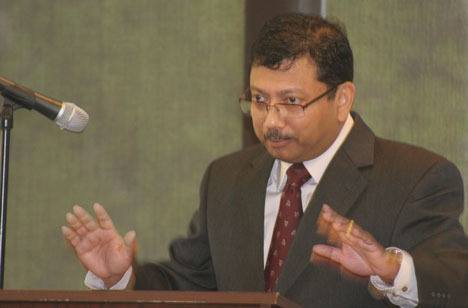USELESS BAY – The Great Recession is over, but the unemployment rate will continue to climb in Washington in the months ahead.
That was the grim forecast from Arun Raha, the state’s chief economist, as the much-anticipated panelist outlined the economic state of Washington at the Island County Economic Development Council’s annual luncheon on Wednesday.
Raha said the economy will gain traction by mid-year, but warned that progress will slow, despite job growth in the state and across the country.
“But there are headwinds at the same time,” he added. “There are many things that can go wrong with the recovery.”
Raha, who is also executive director of the Washington State Economic and Revenue Forecast Council, said the challenges mainly center on commercial real estate and struggling community banks. That’s something that has been evident locally in recent days; last Friday, Whidbey Island Bank bought out Lynwood-based City Bank, which closed by regulators after being beset by $95 million in bad loans.
Raha warned the closure of more banks could pose trouble for the economic recovery.
“Even though the major crisis has been averted, we still have a second shoe that might drop – which is community banks,” Rah said. “We can’t declare victory and go home.”
Still, there is reason to hope.
Washington is the most trade-dependent state in the nation, per capita, and with East Asia growing fast, exports – both agricultural and non-agricultural – will help Washington recover faster than the nation. Stability at Boeing and Microsoft means the state is poised to outperform the nation.
“As the nation comes out of the recession, we will come out at a faster rate,” Raha said.
The unemployment rate in Washington is about 9.5 percent, just a bit lower than the national unemployment rate of 9.7 percent. But Raha noted that as far as recessions go, this one was historic.
“It was a bad recession. It was worse than 2001, it was worse than 1991,” he said.
“That’s why it was called the Great Recession. The word depression was already taken,” Raha quipped.
The current recession started in September 2007, and Raha guessed it actually ended in August 2009. But compared to the 1981-82 recession, the country regained all of the nearly 3 million jobs lost during that sour spell within 24 months.
By contrast, it’s been 24 months since the start of the Great Recession and the number of job lost is still severe.
“We are still over 8 million jobs below where we fell off from, so the national economy is still just limping along,” he said.
Although recent data shows growth in services and manufacturing, the unemployment rate has not peaked, and probably won’t, until later in the spring.
“Employers don’t hire until they’re sure we have a recovery,” Raha said, adding that he expected the state’s unemployment rate to top 9.8 percent.
“It will go up even as we are adding jobs,” he said, in part, because unemployed workers previously discouraged for looking for work will become hopeful and restart their search for a new job.
Bank lending appears to be easing — but not for commercial real estate — and credit remains tight for small businesses. That’s a concern because small businesses will lead the recovery.
Small businesses create most of the jobs in Washington. Since 1992, roughly two thirds of the job growth has been attributed to businesses with fewer than 500 employees.
While housing is starting to rebound, Raha said the recovery has been led by the starter home sector, fueled by the federal tax credit for first-time home buyers.
That credit ends soon, and “organic growth,” Raha said, likely won’t be seen in the housing industry until next year.
The EDC luncheon attracted a crowd of more than 70 business and government leaders. Two 10th District lawmakers — Rep. Norma Smith and Sen. Mary Margaret Haugen — gave an overview of the legislative session that recently wrapped up, noting the dire budget cuts forced on state government by the sputtering economy.
Haugen called the session “brutal,” but pointed to a few bright spots, such as major investments in infrastructure that would put people to work.
She also trumpeted the jobs created by building new ferries for the state of Washington, and said that she expects the eventual construction of 144-vehicle-capacity ferries would mean more work for Nichols Brothers Boat Builders in Freeland.
“I think we can expect a lot of work on the island from those boats also,” Haugen said.




